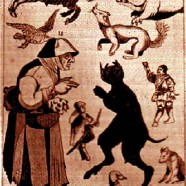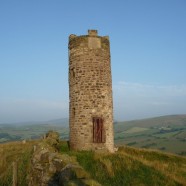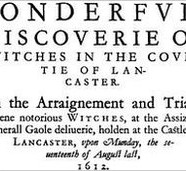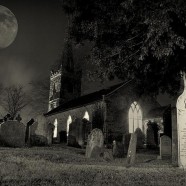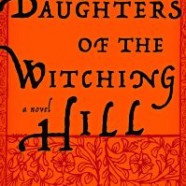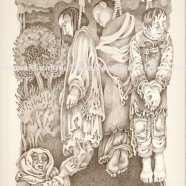British Folk Magic & Familiar Spirits
In popular imagination, the figure of a witch is accompanied by her familiar, a black cat. Is there any historical authenticity behind this cliché? Our ancestors in the 16th and 17th centuries believed that magic was real. Not only the poor and ignorant believed in witchcraft and the spirit world—rich and educated people believed in spellcraft just as strongly. Cunning folk were men and women who used charms and herbal cures to heal, foretell the future, and find the location of stolen property. What they did was illegal—sorcery was a hanging offence—but few were arrested. The need for the...
Read MoreThe Pendle Witches and Their Magic, Part Two
Blacko Tower, a Victorian folly (ca 1890) near Malkin Tower Farm, LancashireThe crimes of which Mother Demdike and her fellow witches were accused dated back years before the 1612 trial. The trial itself might have never happened had it not been for King James I’s obsession with the occult. Until his reign, witch persecutions had been relatively rare in England compared with Scotland and Continental Europe. But James’s book Daemonologie presented the idea of a vast conspiracy of satanic witches threatening to undermine the nation. Shakespeare wrote his play Macbeth, which presents the first...
Read MoreThe Pendle Witches and Their Magic, Part 1
In 1612, in one of the most meticulously documented witch trials in English history, seven women and two men from Pendle Forest in Lancashire, Northern England were executed. In court clerk Thomas Potts’s account of the proceedings, The Wonderfull Discoverie of Witches in the Countie of Lancaster, published in 1613, he pays particular attention to the one alleged witch who escaped justice by dying in prison before she could come to trial. She was Elizabeth Southerns, more commonly known by her nickname, Old Demdike. According to Potts, she was the ringleader, the one who initiated all the...
Read MoreAll Hallows Eve in Old Lancashire
Come Halloween, the popular imagination turns to witches. Especially in Pendle Witch Country, the rugged Pennine landscape surrounding Pendle Hill, once home to twelve individuals arrested for witchcraft in 1612. The most notorious was Elizabeth Southerns, alias Old Demdike, cunning woman of long-standing repute and the heroine of my novel Daughters of the Witching Hill. How did these historical cunning folk celebrate All Hallows Eve? All Hallows has its roots in the ancient feast of Samhain, which marked the end of the pastoral year and was considered particularly numinous, a time when the...
Read MoreNew Year, New Book
DAUGHTERS OF THE WITCHING HILL, my novel exploring the true story of the Pendle Witches of 1612, is now out in paperback.The wild, brooding landscape of Pendle Hill in Lancashire, Northern England, my home for the past nine years, gave birth to my novel, DAUGHTERS OF THE WITCHING HILL, which tells the true story of the Pendle Witches.In 1612, seven women and two men from Pendle Forest were hanged for witchcraft, but the most notorious of the accused, Bess Southerns, aka Mother Demdike, cheated the hangman by dying in prison. This is how Thomas Potts, describes her in THE WONDERFULL...
Read MoreAll Hallows Tide in Pendle
When Halloween comes around, the popular imagination turns to ghosts and hauntings. And to witches.Especially in my neck of the woods. I live in Pendle Witch Country, the rugged Pennine landscape surrounding Pendle Hill, once home to twelve individuals arrested for witchcraft in 1612. Unfortunately Halloween seems to drag out all kinds of ghoulish speculation about historical witches and cunning folk in a way that is not only historically inaccurate but disrespectful to the dead. The Pendle Witches were not ghouls, but real people who were held for months in a lightless dungeon in Lancaster...
Read More
